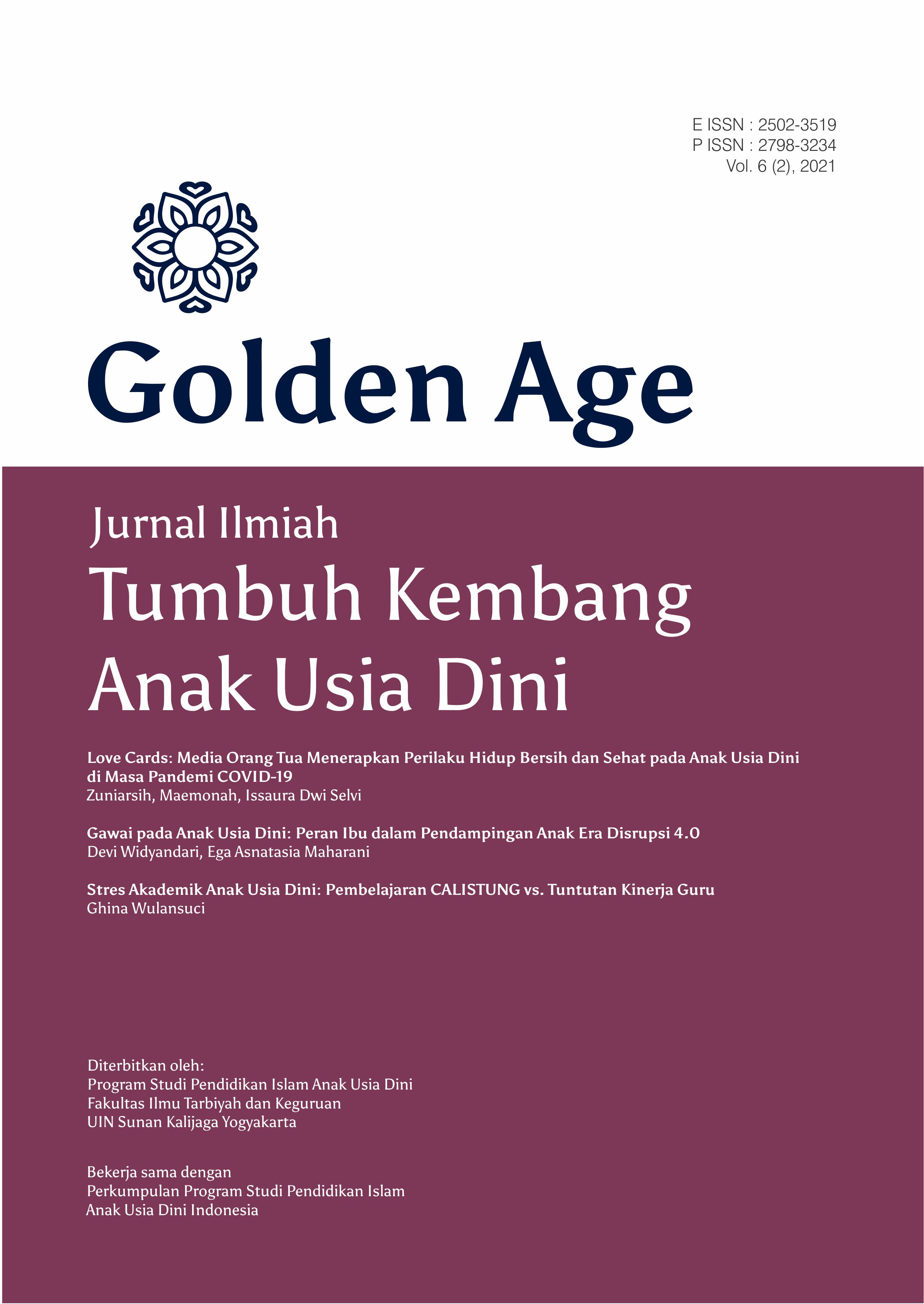1032
Views
1172
Downloads
 Open Access
Open Access
Love Cards: Media Orang Tua Menerapkan Perilaku Hidup Bersih dan Sehat pada Anak Usia Dini di Masa Pandemi COVID-19
Main Article Content
Abstract
The impact of COVID-19 has had a major impact on the protection of children's health. Parents need to supervise children in implementing clean and healthy living behavior to avoid COVID-19. The purpose of this research is to use love cards as a form of activity to increase enthusiasm for protecting children's health. This research refers to the type of quantitative quasi-experimental research that applies one group pre-test-post-test design. Data collection techniques using interviews, questionnaires, and documentation. The subject of this study involved 20 parents who provide the results of children's development achievements. The results showed that the application of clean and healthy living behavior during the pre-test was 25%, and after being given treatment using love cards, the percentage was 85%. There was a significant increase from pre test to post test by 60%. That study using love cards have a good effect on increasing the application of clean and healthy living behavior (PHBS) in early childhood.
Keywords:
Article Details
How to Cite
Copyright
Copyright Notice
Authors who publish with this journal agree to the following terms:
- Authors retain copyright and grant the journal the right of first publication with the work simultaneously licensed under a Creative Commons Attribution-NonCommercial 4.0 International License that allows others to share the work with an acknowledgment of the work's authorship and initial publication in this journal, provided that the work is not used for commercial purposes.
- Authors can enter into separate, additional contractual arrangements for the non-exclusive distribution of the journal's published version of the work (e.g., post it to an institutional repository or publish it in a book), with an acknowledgement of its initial publication in this journal.
- Authors are permitted and encouraged to post their work online (e.g., in institutional repositories or on their website) prior to and during the submission process, as it can lead to productive exchanges, as well as earlier and greater citation of published work.
Privacy Statement
The names and email addresses entered in this journal site will be used exclusively for the stated purposes of this journal and will not be made available for any other purpose or to any other party.
How to Cite
References
Arikunto, S. (2014). Prosedur Penelitian suatu Pendekatan Praktik. Rineka Cipta.
Cahyati, N., & Kusumah, R. (2020). The Role of Parents in Applying Learning at Home During the Covid Pandemic 19. Journal Golden Age, Universitas Hamzanwadi, 4(2), 322-332.
Daradjat, Z. (2012). Ilmu Pendidikan Islam. Bumi Aksara dan PKAI Depag RI.
Iftitah, S. L., & Anawaty, M. F. (2020). Peran Orang Tua dalam Mendampingi Anak di Rumah Selama Pandemi Covid-19. JCE (Journal of Childhood Education), 4(2), 71-81. https://doi.org/10.30736/jce.v4i2.256
Khadijah, K., & Gusman, M. (2020). Pola Kerja Sama Guru dan Orang Tua Mengelola Bermain AUD Selama Masa Pandemi Covid-19. Kumara Cendekia, 8(2), 154-171. https://doi.org/10.20961/kc.v8i2.41871
Kurniati, E., Nur Alfaeni, D. K., & Andriani, F. (2020). Analisis Peran Orang Tua dalam Mendampingi Anak di Masa Pandemi Covid-19. Jurnal Obsesi : Jurnal Pendidikan Anak Usia Dini, 5(1), 241-256. https://doi.org/10.31004/obsesi.v5i1.541
Latipun. (2012). Psikologi Eksperimen. UMM Press.
Machali, I. (2016). Metode Penelitian Kuantitatif Panduan Praktis Merencanakan, Melaksanakan dan Analisis dalam Penelitian Kuantitatif. MPI Fakultas Ilmu Tarbiyah dan Keguruan Universitas Islam Negeri Sunan Kalijaga.
Mardhianti, R. (2013). Pesan Kesehatan : Perilaku Hidup Bersih dan Sehat (PHBS) Anak Usia Dini dalam Kurikulum Pendidikan Anak Usia Dini. Jurnal Ilmiah Kesehatan, 2(3). https://doi.org/10.35952/jik.v2i3.71
Moerad, S. K., Susilowati, E., Savitri, E. D., Rai, N. G. M., Windiani, W., Suarmini, N. W., Hermanto, H., Mahfud, C., & Widyastuti, T. (2019). Pendampingan Pelaksanaan Program Perilaku Hidup Bersih dan Sehat (PHBS) Anak Usia Dini - Pos PAUD Terpadu Melati Kelurahan Medokan Ayu - Rungkut Surabaya. SEWAGATI, 3(3), 90-96. https://doi.org/10.12962/j26139960.v3i3.6016
Munawaroh, Z. A. (2019). Pengaruh Pemberian Reward Stiker Bintang terhadap Percaya Diri Anak Kelompok B di TK Thoriqussalam Sidoarjo. JECED : Journal of Early Childhood Education and Development, 1(1), 21–29. https://doi.org/10.15642/jeced.v1i1.494
Notoadmodjo, S. (2014). Promosi Kesehatan dan Ilmu Perilaku. Rineka Cipta.
Novitasari, Y. (2018). Penyuluhan Program Perilaku Hidup Bersih dan Sehat (PHBS) Melalui Kegiatan Cuci Tangan Pakai Sabun pada Pendidikan Anak Usia Dini. Jurnal Pengabdian Masyarakat Multidisiplin, 2(1), 44-49. https://doi.org/10.36341/jpm.v2i1.573
Nurkolis, N., & Muhdi, M. (2020). Keefektivan Kebijakan E-Learning Berbasis Sosial Media pada PAUD di Masa Pandemi Covid-19. Jurnal Obsesi : Jurnal Pendidikan Anak Usia Dini, 5(1), 212-228. https://doi.org/10.31004/obsesi.v5i1.535
Nurlaeni, & Juniarti, Y. (2017). Peran Orang Tua dalam Mengembangkan Kemampuan Bahasa pada Anak Usia 4-6 Tahun. Jurnal Pelita PAUD, 2(1), 51-62. https://doi.org/10.33222/pelitapaud.v2i1.196
Priambodo, S., & Prabawani, B. (2016). Pengaruh Persepsi Manfaat, Persepsi Kemudahan Penggunan, dan Persepsi Risiko terhadap Minat Menggunakan Layanan Uang Elektronik (Studi Kasus pada Masyarakat di Kota Semarang). Jurnal Ilmu Administrasi Bisnis, 5(2).
Rahmawati, E., Padmawati, R. S., & Widyatama, R. (2008). Analisis Kebutuhan Program Promosi Pencegahan Diare pada Anak Berusia di Bawah Dua Tahun. Berita Kedokteran Masyarakat, 24(3), 111-119. https://doi.org/10.22146/bkm.3588
Soetjiningsih. (2012). Tumbuh Kembang Anak. EGC.
Sudarna. (2014). Pendidikan Anak Usia Dini Berkarakter. Genius Publisher.
Sugiyono. (2016). Kuantitatif, Kualitatif, dan R&D. Alfabeta.
Suryabrata, S. (2014). Metodologi Penelitian. PT. Rajagrafindo Persada.
